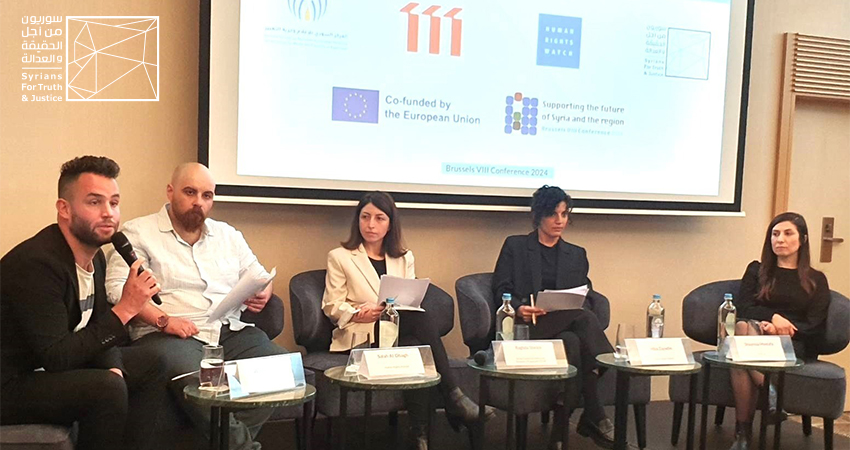At the Brussels VIII Conference on “Supporting the future of Syria and the region”, international and Syrian organizations conducted a joint side event on 29 April 2024, in Brussels, Belgium. The event focused on the growing challenges faced by Syrian refugees in neighboring countries, specifically Türkiye and Lebanon. The discussion centered on instances of forced deportation and the infringement of refugees’ legal rights in these countries.
The event was jointly organized by Syrians for Truth and Justice (STJ), Human Rights Watch (HRW), the Syrian Center for Media and Freedom of Expression (SCM), and the Belgian organization 11.11.11.
The speakers in the discussion were Shaima Mustafa, Institutional Partnership Development Coordinator; Raghdaa al-Sheikh, Coordinator at the SCM; Hiba Zayadin, Senior Researcher at HRW; and Salah Dabbagh, Syrian human rights activist and lawyer. William Staas, Policy and Partnership Advisor for the Middle East and North Africa at 11.11.11, moderated the discussion.
Shaima Mustafa addressed the plight of Syrians in Türkiye, describing it as a “state of legal oblivion and loss.” She emphasized that this state led to their deprivation of rights guaranteed by laws and legislation, such as obtaining residency or a work permit and even obtaining housing after the devastating earthquake of February 2023. She also raised concerns about violations, including forced deportation, which is the most terrifying for refugees. Mustafa noted that political parties vying for power in Türkiye are exploiting the refugee file and blaming them for economic crises, which has worsened their situation.
Salah al-Dabbagh recounted his personal experience of refugee rights violations in Türkiye. He was falsely accused by the Turkish press of “inciting against the state and the people” as a result of a baseless lawsuit filed by a powerful Turkish politician. This was in response to al-Dabbagh’s advocacy for refugee rights in Türkiye. He revealed that his mother was detained by the authorities as a “hostage” and was threatened with death or deportation to Syria if he did not surrender. This incident, which al-Dabbagh described as unprecedented in Türkiye’s history, ultimately led to his surrender to the Turkish authorities.
Raghdaa al-Sheikh spoke about the situation of Syrian refugees in Lebanon. She mentioned that there are over one and a half million refugees in Lebanon, with more than half of them living below the poverty line. Al-Sheikh emphasized that “Only 17 percent of these refugees have residency permits, while the rest face daily challenges related to freedom of movement, getting aid, and registering deaths and births.” Sheikh explained that since 2014, the Lebanese government has been trying to reduce the number of Syrian refugees in Lebanon. In 2021, the Lebanese General Security forcibly deported thousands of Syrians by destroying their camps, expelling them from work, or arbitrarily arresting them at security checkpoints, and raiding homes to find refugees, despite saying their return to Syria was “voluntary.” Al-Sheikh also pointed out the increase in violent attacks against Syrian refugees in recent weeks following the assassination of a Lebanese politician.
Hiba Zayadin stated that reports from various UN agencies and humanitarian organizations, including HRW, stressed that “There are no safe areas in Syria, including those occupied by Türkiye, which Ankara claims are safe for the return of refugees.” Zayadin confirmed that these Turkish-held areas, like others in Syria, are marked by insecurity, lawlessness, and widespread crime. Ziyadin also highlighted Türkiye’s policy to diminish the Kurdish presence in regions with diverse populations, such as Afrin, Ras al-Ayn/Serê Kaniyê, and Tell Abyad. She pointed out that state institutions in all Syrian regions have deteriorated into forms of organized crime organizations, underscoring that Syria as a whole is not safe.

